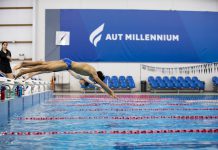The Short Game, released in 2013, documents the lives of a group of young golfers and their chase towards World Championships glory.
The eventual winner of the 7-year-old category, Allan Kournikova, of West Palm Beach, Florida, had this to say about his playing experiences:
“My total is 102 trophies, they’re so shiny, and they’re good art, and it’s just good to have a collection of them.”
It’s a fascinating story and one that provides real-life insight into the professionalisation of the game at the youth level.
The Perils of Early Specialisation
The documentary typifies early specialisation, defined in the scientific literature as intensive training in a single sport for more than eight months of the year before the age of 12.
Now, six years after the film came out, the perils of early specialisation for young athletes are being talked about more and more.
In particular, the increased in risk of injury.
In fact, there is evidence to show that young athletes with overuse injuries are more likely to be highly specialised.
Why Specialise Early?
The shining lights of stardom, of course.
It is thought that success at the elite level, and the associated perks, including the astronomical salaries earned by the world’s best, are driving our behaviour at the youth level.
Well, perhaps.
But stardom for a 7-year-old is years away.
Are we really motivated by what might happen so far into the future?
The Ego is the Enemy
A much stronger motivator is our ego.
The prospect of raising our status today, or tomorrow, is significantly more appealing than several years from now.
We play the short game because our ego likes it.
We chase the win on Saturday, or first place in this year’s Junior World Championship because of how it makes us feel today.
Rethinking Specialisation
When we hear about the increased risk of injury or psychological distress that can result from early sports specialisation, it falls on deaf ears.
Why?
Because it hasn’t happened to us yet.
Nor do we think there’s a chance of it happening to us tomorrow.
But, ultimately, it does nothing to stoke the ego.
To effectively address the inherent risks of early sport specialisation, we need to talk less about the possibility of bad things happening in the future, and more about the beliefs we hold of the world today.





































